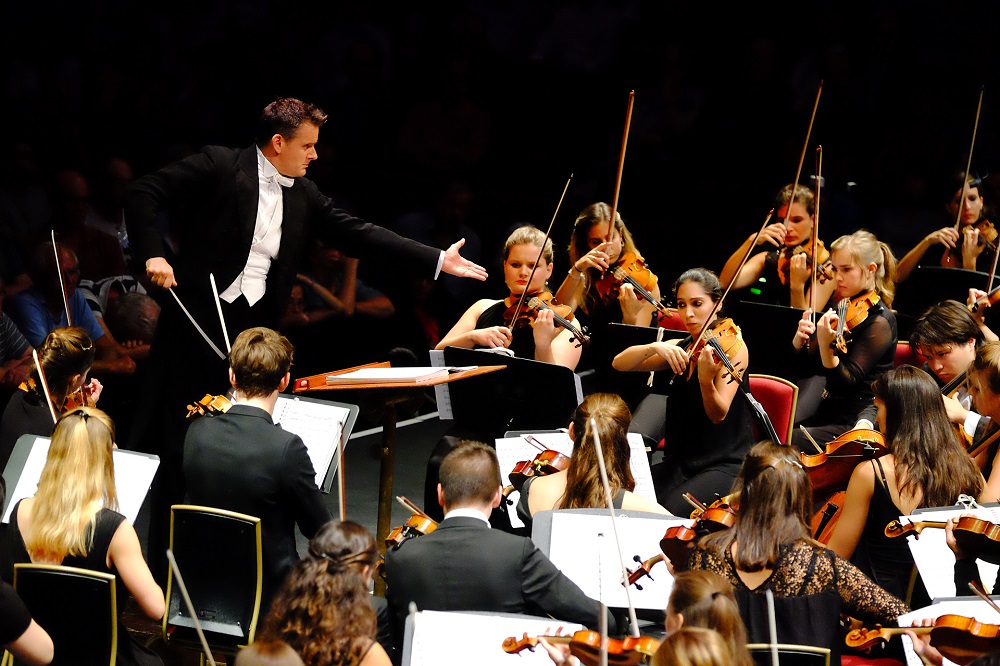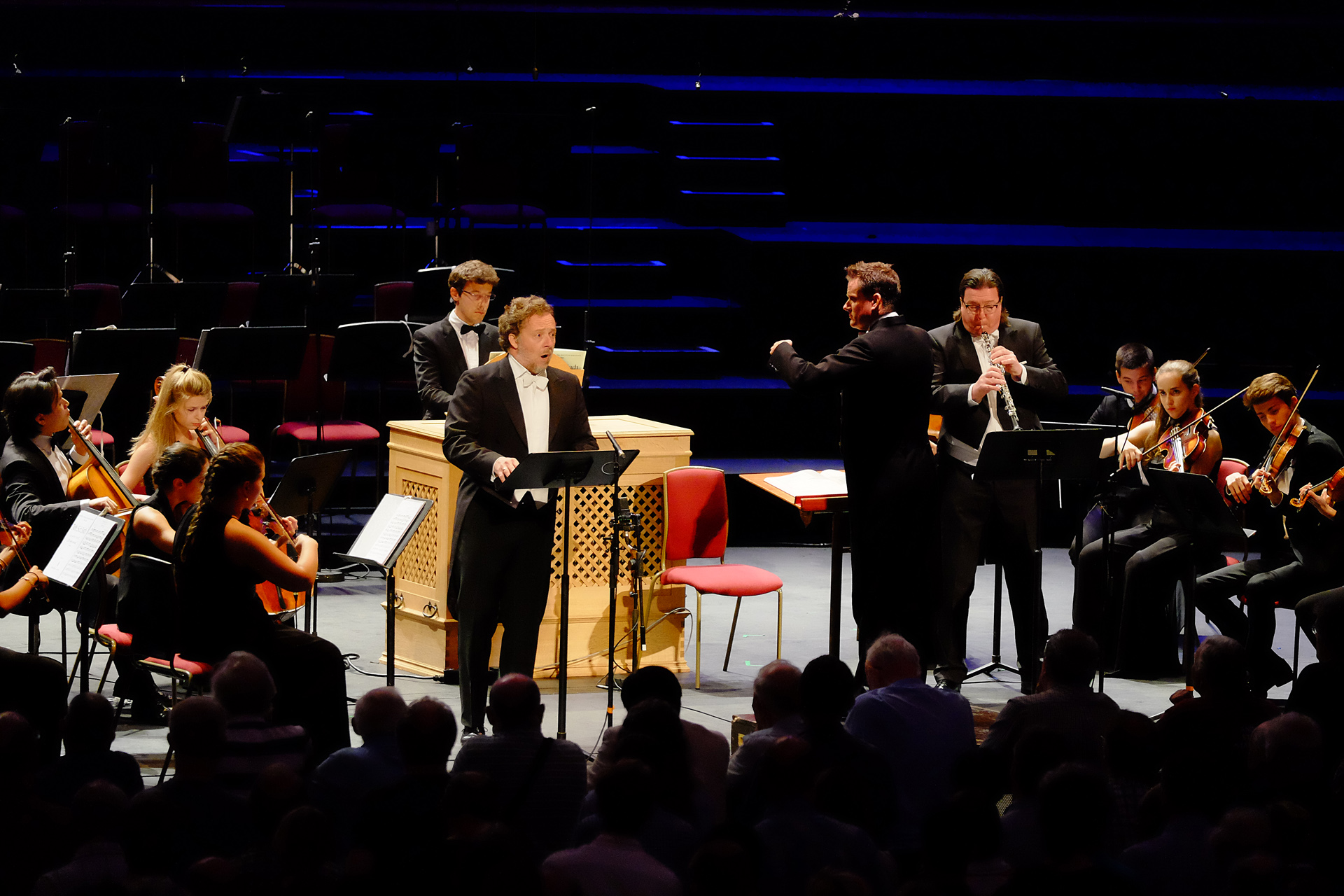Prom 60: Gerhaher, Gustav Mahler Jugendorchester, Jordan | reviews, news & interviews
Prom 60: Gerhaher, Gustav Mahler Jugendorchester, Jordan
Prom 60: Gerhaher, Gustav Mahler Jugendorchester, Jordan
Young Europeans glow, but a usually great baritone disappoints
There is no reason why young musicians shouldn't make something special out of mature thoughts on mortality. Nor is the Albert Hall problematic when it comes to haloing intimate Bach as finely as it does massive Bruckner. The Gustav Mahler Youth Orchestra glowed in both the large scale and the small last night. Any shortcomings were in senior hands and hearts - possibly those of a usually great conductor, Philippe Jordan, more likely the infirm purpose of his composer, Bruckner.
First, though, the orchestral sound: warm, layered, very middle-European. Odd, that, since although Claudio Abbado took his initial pick in 1986 from under-26-year-olds in Austria, what was then Czechoslovakia and Hungary, the ensemble is now truly pan-European (a shame the nationalities couldn't be listed in the programme, as they usually are with the European Union Youth Orchestra - concurrently playing Bruckner under Haitink, incidentally). Jordan knew how to draw the most intense, humming pianissimos from the differently sized strings in Bach and Bruckner, to build the many long term crescendi in Bruckner's Ninth, to draw the right kind of fire in the conflagrations of the first-movement development and finale.
So did the massive poundings and the weird trio-rush of the Scherzo. All this tells us of Bruckner's faltering faith and his chronic disturbances more compellingly than swathes of the first movement, at least as it stood here. Maybe Jordan's point is that the hidings to nowhere can't really be controlled, but as so often with this composer it just feels wrong, inorganic, except in the most extraordinary of hands (Wand and Colin Davis in the last years of their lives, Blomstedt who, as the previous night's Prom had proved, is still very much alive).
Is Bruckner the right composer to feed to young musicians? Are they wasting some of the best months of their lives on something that may be ungraspable, however compelling and unique? Call these the questions of a writer with a blind spot, but with each year that I hear the Bruckner symphonies, I seem to grasp and like them less. Which is unfortunate, because there are three more to come in the last week of this year's Proms.
What a disappointment, then, that this great baritone voice, usually dark-hued enough to suggest bass resonances, found Bach's tricky compass so problematic. Time and again the lines petered out in the lower-register notes - and you can't blame that on the venue. Nor is Gerhaher an easy communicator, essential for a soloist working with a youth orchestra. You can see the tension in the shoulders, the lack of ease compared to the flow and grace of the Gustav Mahler strings so expressively urged by Jordan. Proms programmes often defy expectations; a relatively tame-looking 2016 prospectus has been vindicated by many extraordinary performances. It's just a pity that this time, the result was a less than happy one.
rating
Explore topics
Share this article
Add comment
The future of Arts Journalism
You can stop theartsdesk.com closing!
We urgently need financing to survive. Our fundraising drive has thus far raised £49,000 but we need to reach £100,000 or we will be forced to close. Please contribute here: https://gofund.me/c3f6033d
And if you can forward this information to anyone who might assist, we’d be grateful.

Subscribe to theartsdesk.com
Thank you for continuing to read our work on theartsdesk.com. For unlimited access to every article in its entirety, including our archive of more than 15,000 pieces, we're asking for £5 per month or £40 per year. We feel it's a very good deal, and hope you do too.
To take a subscription now simply click here.
And if you're looking for that extra gift for a friend or family member, why not treat them to a theartsdesk.com gift subscription?
more Classical music
 Robin Holloway: Music's Odyssey review - lessons in composition
Broad and idiosyncratic survey of classical music is insightful but slightly indigestible
Robin Holloway: Music's Odyssey review - lessons in composition
Broad and idiosyncratic survey of classical music is insightful but slightly indigestible
 Classical CDs: Wolf-pelts, clowns and social realism
British ballet scores, 19th century cello works and contemporary piano etudes
Classical CDs: Wolf-pelts, clowns and social realism
British ballet scores, 19th century cello works and contemporary piano etudes
 Bizet in 150th anniversary year: rich and rare French offerings from Palazzetto Bru Zane
Specialists in French romantic music unveil a treasure trove both live and on disc
Bizet in 150th anniversary year: rich and rare French offerings from Palazzetto Bru Zane
Specialists in French romantic music unveil a treasure trove both live and on disc
 Scottish Chamber Orchestra, Ibragimova, Queen’s Hall, Edinburgh review - rarities, novelties and drumrolls
A pity the SCO didn't pick a better showcase for a shining guest artist
Scottish Chamber Orchestra, Ibragimova, Queen’s Hall, Edinburgh review - rarities, novelties and drumrolls
A pity the SCO didn't pick a better showcase for a shining guest artist
 Kilsby, Parkes, Sinfonia of London, Wilson, Barbican review - string things zing and sing in expert hands
British masterpieces for strings plus other-worldly tenor and horn - and a muscular rarity
Kilsby, Parkes, Sinfonia of London, Wilson, Barbican review - string things zing and sing in expert hands
British masterpieces for strings plus other-worldly tenor and horn - and a muscular rarity
 From Historical to Hip-Hop, Classically Black Music Festival, Kings Place review - a cluster of impressive stars for the future
From quasi-Mozartian elegance to the gritty humour of a kitchen inspection
From Historical to Hip-Hop, Classically Black Music Festival, Kings Place review - a cluster of impressive stars for the future
From quasi-Mozartian elegance to the gritty humour of a kitchen inspection
 Shibe, LSO, Adès, Barbican review - gaudy and glorious new music alongside serene Sibelius
Adès’s passion makes persuasive case for the music he loves, both new and old
Shibe, LSO, Adès, Barbican review - gaudy and glorious new music alongside serene Sibelius
Adès’s passion makes persuasive case for the music he loves, both new and old
 Anja Mittermüller, Richard Fu, Wigmore Hall review - a glorious hall debut
The Austrian mezzo shines - at the age of 22
Anja Mittermüller, Richard Fu, Wigmore Hall review - a glorious hall debut
The Austrian mezzo shines - at the age of 22
 First Person: clarinettist Oliver Pashley on the new horizons of The Hermes Experiment's latest album
Compositions by members of this unusual quartet feature for the first time
First Person: clarinettist Oliver Pashley on the new horizons of The Hermes Experiment's latest album
Compositions by members of this unusual quartet feature for the first time
 Gesualdo Passione, Les Arts Florissants, Amala Dior Company, Barbican review - inspired collaboration excavates the music's humanity
At times it was like watching an anarchic religious procession
Gesualdo Passione, Les Arts Florissants, Amala Dior Company, Barbican review - inspired collaboration excavates the music's humanity
At times it was like watching an anarchic religious procession
 Classical CDs: Camels, concrete and cabaret
An influential American composer's 90th birthday box, plus British piano concertos and a father-and-son duo
Classical CDs: Camels, concrete and cabaret
An influential American composer's 90th birthday box, plus British piano concertos and a father-and-son duo
 Cockerham, Manchester Camerata, Sheen, Martin Harris Centre, Manchester review - re-enacting the dawn of modernism
Two UK premieres added to three miniatures from a seminal event of January 1914
Cockerham, Manchester Camerata, Sheen, Martin Harris Centre, Manchester review - re-enacting the dawn of modernism
Two UK premieres added to three miniatures from a seminal event of January 1914

Comments
Blaming Bruckner because you
Blaming Bruckner because you can't understand him is not Nice.
Knew I'd get a comment like
Knew I'd get a comment like that. I wouldn't say 'can't understand', because I've spent many years living with Bruckner and over that time worked on detailed notes for most of the symphonies to try and get to know them better. 'Don't feel much empathy for/with' is more like it, and I admitted that, pace Deryck Cooke, this may be a blind spot. But the more I hear, the more I wonder what's with all the hidings to nowhere. It's part of the music's fascination, and I actually like those performances which illuminate the riven quality the most.
Bruckner is very much a
Bruckner is very much a matter of taste, and is a very acquired taste. You have evidently acquired it. DN has not. Neither have I, in spite of hearing 7 of the symphonies live (indeed, in one calendar year, I heard Symphony No. 7 live 3 times). In fairness, Symphony No. 9 is one of the cases where I get a bit more of what Bruckner wanted to do, at least in the 3rd movement. But overall, his music doesn't do it for me.
This isn't to say that the GMJO didn't do a wonderful job last night in the RAH. They did. If nothing else, the spectacle of so many unison bows in the whiplash pounding notes of the scherzo is a frighteningly impressive sight to behold.
Bruckner does inspire highly partisan feelings on both sides, to be sure. I happened to meet Robin Holloway this evening at the RAH, and I expressed to him my own lack of sympathy for Bruckner, which is the total opposite of his POV. He good-naturedly offered to duel with drawn rapiers. I counter-offered water pistols at 6 paces. I've met other people with very-strong pro-Bruckner feelings, and just as many, if not more, who are not sympathetic to Bruckner's works. Interestingly, many of the latter are orchestra musicians themselves.
Great. A review, and
Great. A review, and comments, from people who "don't understand" Bruckner. (Frankly, I don't understand people who "don't understand" Bruckner, but that's by the by). I sometimes wonder if people like this are trying to hard to find something in the music, rather than just letting the music take them where it does. Maybe it's the difference between musicologists and musicians.
I found this performance to be one of the best I've heard. I loved the way he smoothed over the joins that so many other conductors seem to be keen to use to break up the music, and the playing of the orchestra put many a professional orchestra to shame. I didn't like some of the rushing in the second movement, nor at the end of the 3rd - although I can understand not wanting to prolong the agony of the Wagner Tubas, as I've heard more than one performance marred by split notes right at the end.
Overall, a wonderful and powerful performance. Well done to all concerned.
As Geo. points out, and I
As Geo. points out, and I have the same experience myself, orchestral musicians are just as divided as 'musicologists'. I think it begins to work if you don't expect Bruckner to take you anywhere, and he often promises it but doesn't, which feels counter-intuitive to the symphonic experience.
Nevertheless he won't let go of the mind. I spent several hours with alternative readings of the Adagio in the days following the concert; both Abbado and Colin Davis do with it what I want from it, which is not to say that they're any more 'correct' than anyone else.